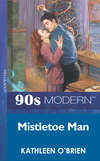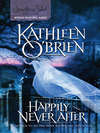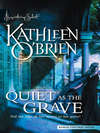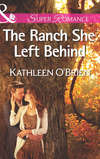Loe raamatut: «Mistletoe Man»
Table of Contents
Cover Page
Excerpt
About The Author
Title Page
CHAPTER ONE
CHAPTER TWO
CHAPTER THREE
CHAPTER FOUR
CHAPTER FIVE
CHAPTER SIX
CHAPTER SEVEN
CHAPTER EIGHT
CHAPTER NINE
CHAPTER TEN
Copyright
“You’ve always disliked me, haven’t you?”
“No,” Lindsay said slowly. “Not always. When I first went to work for you, I…I admired you very much.” He didn’t need to hear how everyone had drooled over him, the good-looking tycoon who ruled from the regal splendor of the tenth floor. The day Daniel brought his daughter to a board meeting, for instance, had been the stuff of legend.
“So when did all that change?” Daniel’s gaze had never faltered from her face.
She raised her glass in a mocking salute. “Well, you did fire me, remember?”
KATHLEEN O’BRIEN, who lives in Florida, started out as a newspaper feature writer, but after marriage and motherhood, she traded that in to work on a novel. Kathleen likes strong heroes who overcome adversity, which is probably the result of her reading—when she was younger—all those classic novels featuring tragic heroes. However, being a true romantic, she prefers her stories to end happily!
Mistletoe Man
Kathleen O’Brien

CHAPTER ONE
LINDSAY BLAISDELL held her breath as the helicopter hit another air pocket, dipping and tilting like a carnival ride. Groaning as its metal belly missed a treetop by inches, she shut her eyes miserably. What on God’s earth was she doing up here? She’d always detested flying, even in a comfortable jumbo jet. But flying through a snowstorm in a tiny, cruelly cold helicopter, just for the joy of meeting with the arrogant Mr. Daniel McKinley—well, that was torture in a class by itself.
And, to put it bluntly, he wasn’t worth it. She hadn’t seen the man in three years, but she hadn’t forgotten him. The thirty-ish wunderkind president of the McKinley Corporation, he’d been smart, stubborn and, at six-foot-two with curling black hair and icy blue eyes, perhaps justifiably self-satisfied. He had been a ruthless businessman, a relentless boss and, by all accounts, a wretched husband. No candidate for sainthood. Not even for the local Mr. Nice Guy.
All in all, she thought bitterly as the helicopter dipped again, he darn sure wasn’t worth dying for.
Snowy treetops lunged toward her, their branches reaching with white, grasping fingers, and the pilot let loose a manic chuckle, as if he and the wind were engaged in a friendly wrestling match. Just the kind of can-do, zealous overachiever Lindsay would have expected Daniel McKinley to employ. Reluctantly the pilot righted the copter at the last minute, having avoided a crash by approximately the breadth of two snowflakes.
As the horizon straightened out, Lindsay swallowed the acrid taste of her morning coffee—which hadn’t even tasted all that great going down—and relaxed her hold on the briefcase she clutched against her pounding heart. When she felt reasonably sure she wasn’t going to be ill, she decided that she hated two things above all others: helicopters, and helicopter pilots who thought near-death experiences were exhilarating.
“There it is,” the pilot yelled over the roar of the rotor. He jabbed his forefinger earthward, still grinning. “McKinley’s place.”
Lindsay peered down and, as the treetops thinned out, a redwood ski lodge appeared just twenty yards below them. McKinley’s place. Massive, elegant and handsome, it claimed this mountain with a silent dominance.
Handsome. Elegant. Domineering. Why did that sound more like McKinley himself than his house? Perhaps, she mused, there was something she hated more than daredevil pilots. She hated arrogant men who sat, enthroned in mountain fortresses, expecting the world to come to them. Even when the weather was wicked and unwelcoming. Even when it was nearly Christmas, and he had to realize that most people wanted to be at home, wrapping presents by the fire.
Suddenly, shoved by an invisible gust, the copter lurched sideways, and branches made awful screeching sounds against the window. Lindsay started and, looking over, saw that the pilot’s grin had flattened out. He gripped the controls tightly, fighting the currents that buffeted his little craft.
“Is everything okay?” she asked. The question was pointless, and the pilot didn’t bother to answer her. She held her breath again as the helicopter began its wobbling descent. The winds were much stronger now than when they had left Denver’s little executive airfield. She hoped this guy was at least half as good as he thought he was.
It seemed to take forever, but finally the helicopter found the ground. It rocked crazily as it landed, like a top bobbling to a stop, and when the motion ceased both pilot and passenger sat speechless, breathing deeply, staring wordlessly at the silent, dark lodge before them.
After a long moment the pilot finally spoke. “Pretty damn bleak, ain’t it? Don’t know what in hell anyone would want to come here for this time of year.”
Lindsay had no answer for that. She didn’t know, either. She certainly wouldn’t have come here by choice. The house did look bleak, its roof shrouded in white, snow creeping up the corners in wind-driven drifts. Dead, almost. As if it waited for someone who would never come back.
But then she shook herself, annoyed. A “dead” house, indeed! She was imagining things simply because she knew about the tragedy that had occurred here three years ago.
No, the only reason this house was so silent was that Daniel McKinley, for all his wealth, didn’t have enough manners to come outside to greet his guest.
Scowling, she unhooked her seat belt. He hadn’t changed at all, had he? He had always been a heartless son of a gun. Didn’t he know the weather had turned nasty? If he didn’t care about her safety, wasn’t he at least concerned about whether his expensive copter-toy might have wrapped itself around a Douglas fir?
Suddenly the double doors of the lodge opened, and two men emerged onto the wide front porch. Lindsay peered through the dim light, but the swirling white air was like bad reception on a television set, and all she could see were two tall, male figures. Frustrated, she opened the door and slid out, sinking ankle deep in snow and dropping her briefcase as she tried to steady herself.
“Curses!” She knew stronger words, gratifying Germanic words that would have fit the occasion much better, but she had long ago trained herself, for Christy’s sake, not to use them. She bent over to retrieve the case, dragging her coat hem through the snow. It was old snow, wet snow, she discovered, lifting the briefcase and the coat simultaneously. A very cold, very slushy snow. “Double-dog-curse the man.”
By the time she was fully upright again, her hair was sticking to her cheeks, and one of the men she had seen on the porch was standing at her side. “Can I help you?” His voice was solicitous, with a hint of a Southern accent, and she knew instantly that it wasn’t Daniel McKinley. She’d never forget the deep timbre of McKinley’s voice.
“Gosh, I’m sorry,” the man was saying. “If we’d known it was you…I mean that you were a woman…” He sounded flustered, and he fumbled for her briefcase, nearly dropping his own case in the process. “I mean, Daniel said he was expecting someone named Robert.”
Lindsay tried to ignore the anxiety that surfaced at his words. It was true, of course. Daniel had, quite rightly, been expecting Robert Hamilton, owner of Hamilton Homes, to be on this helicopter. She knew Daniel wouldn’t be pleased to have to deal with a mere assistant in Robert’s place. And when he found out who the assistant was, when he found out it was Lindsay…
But that couldn’t be helped now. She peeled a hank of half-frozen hair from the edge of her mouth and swallowed a lump of cold air as the second man—Daniel himself—began walking toward the helicopter. Her fingers twitched nervously inside her gloves.
“Daniel!” The man at her side sounded amused. “Your guest has arrived, but I’m afraid it’s no Robert.” He tilted his head at Lindsay. “Perhaps a Roberta?”
“Lindsay,” she corrected, but her voice was husky, nervous. She cleared her throat.
“Roberta Lindsay?” The man’s smile broadened.
Lindsay shook her head. “No,” she said, trying to read Daniel’s expression through the snow, trying to see if he recognized her. “Lindsay Blaisdell.” She squared her shoulders and put out her gloved hand. “Hello, Mr. McKinley.”
“Miss Blaisdell. What a pleasant surprise.” But he didn’t look surprised—he didn’t even look annoyed, which he must have been, especially if he connected this Lindsay Blaisdell with the one he had fired three years ago. But of course, like all good businessmen, he was a master at hiding his emotions.
“Robert wasn’t able to come after all,” she began, already absurdly defensive, especially considering she was answering a question he hadn’t even asked. “He’s not here.”
Daniel smiled. “Evidently,” he said mildly. He turned to the man with the briefcase. “Well, I think we did a good day’s work, Steve. I trust you’ll have a smooth trip back. Wind’s up, but my pilot is very good.”
“He’s very sick,” Lindsay was surprised to hear herself speaking again, but Daniel’s indifference to her presence was somehow galling and she felt an overwhelming urge to make him notice her. How dare he turn his back on her? “His appendix burst.”
Daniel turned slowly, dark brows raised over his quizzical blue gaze. “My pilot?”
Lindsay flushed. He’d noticed her, all right. Noticed her making a fool of herself. She had always felt gauche and tongue-tied around Daniel McKinley, but, darn it, she’d been only twenty then, and ridiculously innocent. Besides, he had no power over her anymore. She didn’t work for him. He couldn’t just summarily fire her for making a stupid comment. He’d already done that.
“No, of course not your pilot,” she said quickly, nearly stammering anyway. “Robert.” When he still looked quizzical, she tried again. “Mr. Hamilton.”
“Yes, of course.” He was smiling again, and she knew he was making fun of her. “Mr. Hamilton, who isn’t here.” He reached across her shoulder to open the helicopter door. “You must tell me all the details as soon as we get inside. But first we have to get Steve in the air. He has a closing in Denver in less than an hour.”
She backed out of the way, biting her lips together to keep from saying anything else idiotic, and watched with mute envy as Steve climbed into the chopper. Taking her elbow, Daniel eased her back even farther as the rotor began to turn, whipping the snow into a frenzy of white, stinging needles. He kept his hand on her arm, and for an uncomfortable moment, as she watched the helicopter rise through the trees, his grip felt like a chain, holding her hostage here, alone with him in this godforsaken outland.
At the last minute Steve waved, his gloved salute barely visible through the thickening snow. And then he was gone. Free. She listened to the disappearing whine of the copter with a sinking heart. Whoever Steve was, wherever he was going, she suddenly would have given a month’s pay to trade places with him.
The fire was huge, dancing orange and red inside a stone hearth that must have been twelve feet across, and deliciously hot. Lindsay sat quite close to it, wriggling her tingling fingers and toes nervously, and surveyed the room into which Daniel McKinley had just escorted her.
It was really three rooms, she saw—a living room, with the cushioned couch in front of the fire, where she now sat thawing; an office, with the intricately carved desk on which Daniel had perched to reach Robert’s paperwork; and a dining room, with a table big enough to seat twelve comfortably.
It was intensely masculine, yet somehow beautiful. Though the room was at least fifty by sixty, she estimated, soft throw rugs with colorful Indian designs spanned the distances easily. On either side of the hearth, huge windows made a picture postcard of the snowy mountainside, and over in the corner a scented Jacuzzi hummed and bubbled.
The fire dominated all of it, casting its warm, amber glow over deep brown wood floors, beamed ceilings, paneled walls, carved banisters. Even the rich mahogany furniture seemed to be alive with the hint of moving light, creating a surprising sense of intimacy.
Surprising, she thought, and unwelcome.
Intimacy, however brief, with Daniel McKinley was not on her Christmas wish list. And it undoubtedly wasn’t on his, either…if men like him ever indulged in such nonsense. He had been courteous but remote as he walked her in, sat her by the fire, poured her a cup of coffee, inquired about her comfort. He had never mentioned the awkward fact that she had once worked for him. But of course he remembered. The fury she’d seen in his eyes the day he had fired her wasn’t likely to die in three short years.
No, she didn’t wish for intimacy—just for a clean conclusion to the negotiations that had brought her here. And, of course, she wished that he would get off the telephone.
It was driving her crazy to see him sitting on the edge of the desk, the telephone hooked between his ear and shoulder, leafing idly, distractedly, through the loan securitization documents, which she knew were the most important papers she had delivered. It was in those documents that he would find his answer: would he buy Hamilton Homes, thereby saving poor Robert’s neck…or would he decide to let his option expire?
But the blasted telephone wouldn’t stop ringing. She had to fight the urge to walk over and unplug the cord from the wall jack. She’d been here thirty minutes, her nerves on edge, mentally rehearsing the lines that would surely persuade Daniel that, in spite of the iffy deals Robert had cut, he could, should, must, buy Hamilton Homes. All in vain. Of those thirty minutes, Daniel had probably spent twenty-eight on the phone.
“Sorry,” he said as, finally concluding the call, he dropped the handset back into its cradle. He had said that five times now, after every interruption.
“That’s all right.” Her answering murmur wasn’t quite as gracious as it had been the first couple of times. Over the past thirty minutes the view through the massive picture windows had grown steadily more opaque, thick with snow. Tall pines were tossing fretfully, bullied by ever-stronger winds. It made her feel slightly sick to think of getting back into that little helicopter.
“Mr. McKinley,” she began, emboldened by her sense of urgency. If the winds kept growing more and more intense, would even Daniel’s wildman pilot dare to fly? “Mr. McKinley, I’d be glad to answer any questions you might—”
A loud noise interrupted the flow of words, and her voice strangled on a shocked gasp as suddenly, from some hidden recess in the rear of the lodge, a huge, glowering man dressed all in black appeared in front of the fire. Her throat went dry. Who—? She had been so sure that she and Daniel were the only two people left on this snowswept mountain.
For a moment the stranger just stood there, his oversize features shifting eerily in the shadows cast by the fire. Lindsay swallowed hard, staring in spite of herself. He was very old, she sensed, though still a giant of a man. His pronounced, overhanging brows were wild and white, and his hair, which tumbled nearly to his shoulders, was as colorless as the snow.
A flashing glint caught Lindsay’s eye, and she dropped her numbed gaze to the man’s hands. But, on the left side, there was no hand. Instead, just beyond the intense black of his work shirt, a metal hook glistened in the firelight, sharply curved and lethal.
She was glad she was sitting down, because suddenly the muscles in her legs went limp. She looked toward Daniel, too stunned to speak.
To her surprise he was smiling. “This better be important, Roc.” His voice was stern, but it was a mock severity. He flipped one of the document’s pages over casually and kept reading while he talked. “Look at Miss Blaisdell’s white knuckles. She’s frustrated by all these interruptions, I deduce, and holding on to her temper with a superhuman effort. She’s eager to finish this deal and get back to civilization.”
The huge man turned his glower in Lindsay’s direction. “Sick of you already, is she? Well, it’ll curdle her guts to hear my news, then.” He turned back to Daniel. “Landwer called. Seems your chopper’s got a rattle, and he’s scared to fly until he finds out where it’s coming from.” He lifted his hook and scratched behind his ear disgustedly. “Yellow-belly wimp-guts.”
“Roc, you really are an animal.” Settling the papers onto his lap, Daniel shook his head. “My apologies, Miss Blaisdell. Mr. Richter here is my caretaker, and I suspect he’s been alone in the wilderness far too long. He’s discarded what few manners he ever had.”
But Lindsay wasn’t even thinking about the man’s rough language. She was too horrified by his message. “There’s something wrong with the helicopter? It’s not coming back?” She stood up, her hands still twisted together, and went to the window, as if she might be able to summon the absent vehicle herself.
But, of course, all she saw was the ever thicker curtain of snow. She turned. “Mr…Roc,” she said as steadily as she could. “Did the pilot say how long it would take to find the problem?”
The big man guffawed. Reaching his good hand out, he grabbed a poker and gave the firewood a rough stirring. The flames roared to new life.
“Don’t hold your breath. Landwer couldn’t find his rump with a compass.”
“Roc.” This time Daniel’s voice was pitched low and held an unmistakable reprimand.
The giant grinned, and the sight transformed his ugly face into something surprisingly sweet. “Sorry, Danny Boy, but it’s true. If the lady flew up here with him she already knows what a baggage-smasher he is. Don’t worry, miss,” he added with another of his amazing smiles. “I’ll fix something special for dinner to make it easier to stomach old Daniel here.”
“Dinner?” Lindsay’s voice rose. “But, Mr. McKinley, I have to get back before that. My sister…Christy’s too young to be alone.” She took a deep breath. She mustn’t panic. There had to be a way out of this mess. She racked her brain. “Don’t you have another helicopter?”
Daniel smiled wryly. “Sorry. We’re just a one-chopper operation up here. Chintzy, I know, but somehow we’ve limped by so far.”
“But there must be a car? Or a truck or something?”
“We do have a Jeep,” Roc began, but Daniel interrupted, slapping the documents down on the desk crisply.
“No driving,” he said. “It’s too dangerous. Besides, Landwer will probably have the rattle vanquished in no time. Don’t accept Roc’s estimate of my pilot’s abilities, Miss Blaisdell. Roc used to fly for me before his accident, and he’s never been very charitable toward his replacement.”
Roc was obviously insulted. He stuffed the poker back into its rack with a terrible clatter. “Listen, Danny Boy, you know bloody well you’d be better off with a couple of carrier pigeons. But what do I care? You and Landwer deserve each other. Anyhow, the Jeep’s ready to go, like it is every winter. I could take her—”
“I said no driving.” Daniel’s earlier lighthearted irony was conspicuously absent. “Go into the kitchen and fix us a good lunch, Roc. Miss Blaisdell will leave when Landwer has repaired the copter. Not before.”
Roc left the room as quietly as he came, allowing his anger to show only in the rigidity of his broad back. Lindsay, who had been watching the astonishing interchange in silence, finally moved forward. What an infuriating man Daniel McKinley was! His tone couldn’t have been more peremptory if both she and Roc had been his children.
“Mr. McKinley, I really do have to be home before dark tonight. My sister is only twelve years old, and I haven’t made any provisions for her care—”
Daniel shrugged one broad shoulder toward the desk. “Feel free to use the telephone.”
Lindsay narrowed her eyes. “There’s no one to call. I must get home before tonight.”
Daniel unfolded himself from the desk, his movements slow and full of coiled, repressed power. His blue eyes were icier than ever.
“You’ll leave when I say it’s safe, Miss Blaisdell.” He looked her up and down, as if assessing her capacity for resistance. “Look, let’s get a couple of things straight. Your boss insisted on this eleventh-hour document delivery, not I. I was content to wait until the new year to purchase Hamilton Homes. I will, in point of fact, survive perfectly well if I don’t buy Hamilton Homes at all.” He met her gaze directly. “Which is more than we can say for your boss, isn’t it?”
“That’s not the point,” she began, but he raised a finger to quiet her words.
“It’s the truth,” he said. “Now let’s be even more honest, shall we? You don’t like me. I remember our last encounter with crystal clarity, and I’m well aware that you’d prefer to be anywhere but here. However, here you are, and you must have known the risk you were taking. Winter in these mountains is notorious. If you’ve been caught by it, we’ll just both have to live with that.”
Her cheeks were burning, but she refused to be intimidated. “My sister needs me, Mr. McKinley,” she repeated stubbornly. “I don’t think you understand—”
“No, damn it, it’s you who doesn’t understand.” He put his hand on her back and with a rough motion turned her toward the picture window. “Look out there. We have a path that leads to Roc’s apartments. It’s newly paved, and it’s lined with tulips in the spring. Can you see it? Can you even begin to guess where it is?”
She looked, desperately scanning the blank white ripples of mounded snow for anything that resembled a path, but she could find nothing.
“No, of course you can’t.” She tried to turn away, but his palm was still hard against her back, forcing her to face the window. She didn’t dare to speak. He suddenly seemed so intense, almost angry, and she wasn’t sure why. Was it because they had finally mentioned the past, that day three years ago when she had uttered one unforgivable sentence?
“You have no idea how treacherous this pretty snow can be,” he said, his voice deeper now, almost hypnotic. “It distorts distances, erases landmarks. Take one wrong step, and you can sink into a pocket ten feet deep. Lose your way once, for even ten seconds, and it’s virtually impossible to reorient yourself.”
“But Roc would be driving,” she said quietly. “We’d be in a car.”
“Roc is seventy-four years old, Miss Blaisdell, and he has one hand. He’s hardly anyone’s superhero. You could drive in circles until you run out of gas and then walk in circles until you’re so exhausted you can’t think straight.”
“But—”
“Would that help your little sister?” He lifted her hand, lightly squeezing her fingertips between his thumb and forefinger. The nerves tingled, and a rapid pulse tnpped against the pressure. “In fifteen minutes your hands and feet would be numb.” He lifted her hand and cupped it against her cheek. “You wouldn’t be able to feel your own face.”
She shivered suddenly, thinking of that bitter cold, of fingers that would never again feel such warmth as this…
He dropped his hand. “And then you would die, Miss Blaisdell. It’s as simple and as terrible as that.”
She turned, but, looking at him, she suddenly didn’t know what to say. His full mouth was downturned and weary. His eyes looked haunted, seeming to stare right through her. And finally she knew what he had really been talking about. Not her death, but another’s. Another car that had foolishly tried to leave this mountain during a blinding, numbing snowstorm. A car that hadn’t, horribly, even been found for two whole days. A car that, when found, had held the frozen bodies of a beautiful woman and her little girl…
“I’m sorry,” Lindsay said, her throat thick and aching with emotions she had no right to express. No right, really, even to feel. “Of course you’re right. I’ll stay.”
Roc brought them lunch in the office area, and while they ate the surprisingly delicious fare—a light, creamy soup and a platter full of fresh fruits and hunks of cheese—Daniel finished studying the documents pertaining to Hamilton Homes.
Lindsay and Roc chatted quietly while Daniel read. Within a very few minutes, Lindsay found herself growing accustomed to Roc’s odd looks and earthy language. She even forgot about his hook, until, with a twinkling wink, he speared the last chunk of cheddar cheese with it and plopped it into his mouth. Lindsay blinked, and then, as if he’d done something quite clever, both of them laughed out loud.
Daniel looked up, frowning, his concentration broken, but Roc just laughed harder. “Go back to your homework, Danny Boy. Can’t you tell the lady and I are busy?”
And with no more than a wry twist of his mouth, Daniel did just that. Lindsay tried to relax. Roc was so natural, so uninhibited, treating Lindsay, whom he had known for approximately an hour, exactly the same way he treated Daniel—it really was impossible not to like him.
Daniel was another matter. Lindsay kept sneaking glances at him, wondering what he thought of the financial details he was learning about Hamilton Homes. It wasn’t all good news, not by any means. She tried to read the set of his mouth, the angle of his body, but it was hopeless. She didn’t know him well enough. She found herself distracted by the play of winter’s odd bluehued sunlight against the black of his hair.
“You wouldn’t know it now,” Roc said, breaking into her abstraction with a plaintive voice, “but twenty years ago I was a great deal more handsome than our Danny Boy. I was a big man, a man’s man, not puny like this fellow here.”
“I’m six-two, you old liar,” Daniel said without taking his eyes from the documents.
Roc chortled. “Puny, like I said.” He stretched out, black jeans covering limbs as long and thick as tree trunks. “Me, I’m not an inch under six-five, and if I’d met you twenty years ago I’d have swept you off your feet, Miss Lindsay.”
Daniel made one last note on the papers, and, sighing, he let the pen drop to the desk. “Don’t you have some caretaking to do, Roc? Big man’s man like you? Wood to chop? Roofs to shingle? Dishes to wash?”
“Nothing wrong with a man washing dishes,” Roc said defensively, lumbering to his feet. “Still, I’d better go,” he whispered to Lindsay as he gathered the empty bowls and munched the last of the grapes. “Danny here can’t stand the competition.”
When he was gone, Lindsay took a deep breath and, folding her hands in her lap, faced Daniel with the stoic air of a witness taking the stand. For Robert’s sake, she had to pull this off. Dear, gentle, improvident Robert, lying in a hospital room right now, impotently worrying, wondering how her interview was progressing.
She waited for the first question, the first scathing comment about what a financial mess Hamilton Homes was in. But the thick silence lengthened uncomfortably. Daniel merely sat with his elbows on his desk, looking contemplatively at her over his steepled fingers, until she felt such tension in her chest that she thought she might scream.
“I know the figures look bad,” she said, unable to bear the loaded silence another minute. “Robert’s been having some problems lately.”
“Evidently,” he murmured, his lips against his fingertips.
“Well, don’t you have any questions?” She had come armed with facts and proposals, with explanations for Robert’s errors and suggestions for how to redeem them. She’d certainly never pictured the interview going like this, with Daniel McKinley sitting there, bored or sleepy or just plain indifferent, his blue eyes half closed, his syllables short and ironic. “Don’t you want to know exactly how this happened, what went wrong?”
He smiled behind his fingers, but Lindsay wasn’t sure it was a pleasant smile. “I know what happened.” When she raised her brows skeptically, his smile broadened and he leaned back in his chair. “Actually, I knew before I even opened these documents—what I’ve read here has merely confirmed what I already suspected.”
“Oh, really?” His tone, so full of a natural, unassumed arrogance, annoyed her. She tightened her hands in her lap. “Why don’t you tell me, then?”
“All right.” He laced his fingers behind his head, a posture that made his shoulders seem even more impossibly broad. “I’d say it boils down to the three main problems. First, Robert Hamilton hired too many people, paid them too much, with luxurious benefits, and he could never bring himself to trim away any of the dead wood or lay off unnecessary positions, even during the recession. Your payroll is hopelessly bloated for a company in these financial straits.”
Her cheeks stung. She had been telling Robert things just like that for years. “Well, being too generous is hardly a sin, is it?”
He ignored her comment, putting one ankle over his knee to get more comfortable. She noticed that his legs were almost as long as Roc’s, though they were lean and muscular beneath the fine wool of his trousers, and didn’t resemble tree trunks by any stretch of the imagination.
“Second—he’s been building houses in all the wrong places, trying to provide single family homes in areas where the income ratios make apartment living far more logical. Then, in order to sell the places, he’s had to make extremely questionable loans. Now there’s a huge percentage of defaults which he’s refusing to call in. Instead of turning over these houses, trying to salvage his investment, he’s carrying these people for months at a time.”
Tasuta katkend on lõppenud.




















